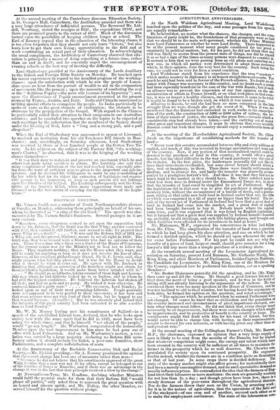POLITICIE MEETINGS.
Mr. Vernon Smith met a number of North Northamptonshire electors at Candle, on Monday, addressing them principally on behalf of his son, whom he described as " a chip of the old block." The speech was cha- racterized by Mr. Yemen Smith's frankness. Several passages in it are very curious.
" Somehow, every clergyman seemed to act upon the supposition laid down by Dr. Johnson, that the Devil was the first Whig; and not contented with that, they carried it still further, and seemed to take for granted that every Whig was a devil." . . . . " It was said the Reform Bill of 1831 was a Whig job, and the present Ministers meant to set all right in 1869. The truth was, they were blessed with a Ministry who had no opinions of their own. There was a time when there was a leader of the House of Commons, but the present course was for the Ministry not to lead but to follow the House. They originate nothing; they ask the House what they want, and will be ready for anythiug so long as it does not involve the loss of office. However, as his excellent philanthropic friend, Sir G. C. Lewis, said, they might propose what bill they pleased, but it was for the House to decide what it should be when it came out. He agreed with Mr. Roebuck in thinking that, although an extension of the franchise might not obtain for them:anybetter legislation, it would make them better satisfied with it." . . . . " He should go as hitherto, taking counsel of those high and honour- able men whom he had hitherto looked up to as leaders, and in whom he had still the highest confidence. He believed the Liberals had shaken off all that ; and had no gods and no party. He wished it were otherwise. He confessed himself a party man." . . . . " His successor, Lord Stanley, he
looked upon as one of their most promising Liberals. People generally not supposed to be very partial to their successors ' - it has been said that some persons were not very fond of their heirs, but he begged to say that was not his ease. (Laughter.) But he was sincerely glad indeed that the interests of this great country had been entrusted to so able a noble- inan as Lord Stanley."
Mr. W. M. Massey having met his constituents of Salford—in a speech of the established Liberal tone, declared, that he who looks upon society now with the same spirit that he did in 1832, must have been asleep the whole time ; and that he himself, " not afraid of the people," would " go any length." Mr. Warburton congratulated the honourable Member upon the vast improvement in him since he had gone out of office with Lord Palmerston. And on Mr. Warburton's motion, a reso- lution was carried by a large majority declaring no Reform Bill satis- factory unless it should include the ballot, a poor-rate franchise, short Parliaments, and a complete redistribution of seats.
At the Anniversary of the Rochdale Conservative Sick and Burial Society,—Mr. Pickles presiding,—Sir A. Ramsay proclaimed the opinion that the recent change has been one of measures rather than men-
" Of course he did not believe that his constituents approved of the great Whig doctrine that a man was not fit for office, except he belonged to one of the families of Greys or Russells ; and if there was an advantage in the change it was in the fact that that principle received a blow by the change."
At Newcastle-on-Tyne, Mr. Hoadlam, doubting whether Ministers Could fulfil the promise made for them that their Reform Bill "would please all parties," only asked them to approach the great question with an honest and sincere spirit ; and Mr. Ridley, the other Member, re- served himself for the question without pledge.


























 Previous page
Previous page